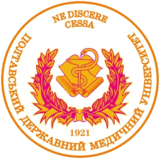Будь ласка, використовуйте цей ідентифікатор, щоб цитувати або посилатися на цей матеріал:
http://repository.pdmu.edu.ua/handle/123456789/22855| Назва: | Аналіз захворюваності та поширеності депресивних розладів жителів Полтавської області в період збройного конфлікту |
| Інші назви: | Analysis of infertility and adjustments of depressive disorders of poltavah regional residents in the period of armed conflict |
| Автори: | Гавловський, Олександр Данилович Голованова, Ірина Анатоліївна Gavlovsky, O. D. Golovanova, I. A. |
| Дата публікації: | 2019 |
| Видавець: | Полтавський державний медичний університет |
| Бібліографічний опис: | Гавловський О. Д. Аналіз захворюваності та поширеності депресивних розладів жителів Полтавської області в період збройного конфлікту / О. Д. Гавловський, І. А. Голованова // Вісник проблем біології і медицини. – 2019. – Вип. 1, т. 1 (148). – С. 304–307. |
| Короткий огляд (реферат): | Будь-який соціальний конфлікт, у тому числі військовий, впливає на стан взаємостосунків
у суспільстві. В першу чергу це стосується соціальних груп та людей, які безпосередньо на собі зазнали наслідків воєнного конфлікту: до них відносяться люди, які змушені були переїхати у зв’язку бойовими
діями на території якій вони проживають, сім’ї, які зазнали втрат внаслідок Російської агресії та проведення Антитерористичної операції. Одним з наслідків конфлікту є зростання людей з девіантною поведінкою
в суспільстві. Девіантність провокують проблеми бездомності, дитячої занедбаності, різних видів насилля,
безробіття, соматичні та психічні захворювання, інвалідність, міграції та меншини, що мають недостатні ресурси, проблеми ув’язнення, проблеми людей похилого віку та ін. The consequences of military traumatic stresses for an individual correlate with the public opinion shaped in the society regarding the very military conflict and the role of participants in hostilities. In the public consciousness the attitude towards the war is formed depending on its scale and subject of the conflict. Thus, military actions can qualify as defensive or aggressive societies. In a full-scale war, social time is divided into two periods “before the war” and “after the war”, for each of these periods and in the public consciousness produces its values, norms of conduct and rules of social life. Victory and defeat of fighters in the war, experiencing victories and defeats of all people. Any social conflict, including military, affects the state of social interactions. First of all it concerns social groups and people directly affected by the consequences of the conflict. These include internally displaced persons (IDPs), families who suffered losses as a result of Russian aggression and the conduct of the Anti-Terrorist Transition, citizens living in territories where a significant number of HIPs has arrived, etc. One of the consequences of the conflict, as noted by the Ukrainian researcher of the intellectual component of the training of future specialists in the social sphere to work with deviants Melnychuk OB, is the growth of clients with deviant behavior in society. Deviance provokes the problems of homelessness, child neglect, various forms of violence, unemployment, somatic and mental illness, disability, migration and minorities with inadequate resources, imprisonment problems, the problems of the elderly, and others. Taking into account that the Ukrainian community in every settlement every day through the media is exposed to negative informational influence, we studied the mental illness – depressive disorders of the inhabitants of Poltava and the region. The morbidity and prevalence of depressive disorders in the cities of Poltava and Poltava region were studied with the new WHD Classification ICD 11. The following forms of depressive disorders were studied in the Report Form 10, “Report on the Disease of People with Mental Disorders and Behavior”: F3-39 Mood Disorders (Affective Disorders, F40-48 – neurotic and somatic disorders, F43.0 – incidence of severe stress and violation of adaptation. These were taken at the Poltava Regional Psychoneurological Dispensary. Statistical analysis was performed using dynamic series, counting baseline growth rate, and odds ratio (HS). Design for epidemiological, descriptive, and retrospective studies. New realities of the existence of the Ukrainian people, lead to the destruction of the nation-wide socio-psychological balance and require new approaches to providing social and psychological assistance to the population. Psycho-traumatic events, the complicated social situation that has developed in Ukraine give rise to anxiety and experience of the population, not only the steel and the military. Euphoria from a deceptive victory over injustice was objectively implemented for society by the annexation of Crimea and a military conflict in eastern Ukraine. The society is overcome by frustration and disappointment, and as a result, the socio-economic crisis and the unstable political situation in the country. The depletion of the ability to hope and hope for the better causes depressing tension, increasing depressive mood, leading to a series of personal and interpersonal conflicts. The result of these disadaptive states is the psychopathisation of the individual and the increase in the number of psychosomatic and somatopsychic diseases. |
| Ключові слова: | аналіз захворюваність поширеність депресивні розлади девіанти психотравмуючі події analysis morbidity prevalence depressive disorders deviant psycho-traumatic events |
| ISSN: | 2077-4214 2523–4110 |
| DOI: | 10.29254/2077-4214-2019-1-1-148-304-307 |
| URI: | http://repository.pdmu.edu.ua/handle/123456789/22855 |
| Розташовується у зібраннях: | Вісник проблем біології і медицини, Випуск 1, Том 1 (148) |
Файли цього матеріалу:
| Файл | Опис | Розмір | Формат | |
|---|---|---|---|---|
| Analysis_of_infertility_and_adjustments.pdf | 123,15 kB | Adobe PDF | Переглянути/Відкрити |
Усі матеріали в архіві електронних ресурсів захищені авторським правом, всі права збережені.



